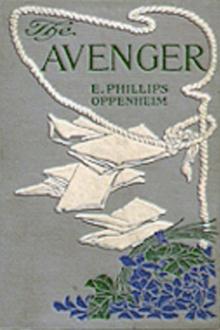In the Fog, Richard Harding Davis [best selling autobiographies .TXT] 📗

- Author: Richard Harding Davis
Book online «In the Fog, Richard Harding Davis [best selling autobiographies .TXT] 📗». Author Richard Harding Davis
“Her house had been pointed out to him, and though he had never visited it, he had passed it many times and knew its exact location. He accordingly drove in that direction, as far as the fog would permit the hansom to go, and walked the rest of the way, reaching the house about nine o’clock. He rang, and was admitted by the Russian servant. The man took his card into the drawing-room, and at once his brother ran out and welcomed him. He was followed by the Princess Zichy, who also received Arthur most cordially.
“‘You brothers will have much to talk about,’ she said. ‘I am going to the dining-room. When you have finished, let me know.’
“As soon as she had left them, Arthur told his brother that their father was not expected to outlive the night, and that he must come to him at once.
“‘This is not the moment to remember your quarrel,’ Arthur said to him; ‘you have come back from the dead only in time to make your peace with him before he dies.’
“Arthur says that at this Chetney was greatly moved.
“‘You entirely misunderstand me, Arthur,’ he returned. ‘I did not know the governor was ill, or I would have gone to him the instant I arrived. My only reason for not doing so was because I thought he was still angry with me. I shall return with you immediately, as soon as I have said good-by to the Princess. It is a final good-by. After tonight, I shall never see her again.’
“‘Do you mean that?’ Arthur cried.
“‘Yes,’ Chetney answered. ‘When I returned to London I had no intention of seeking her again, and I am here only through a mistake.’ He then told Arthur that he had separated from the Princess even before he went to Central Africa, and that, moreover, while at Cairo on his way south, he had learned certain facts concerning her life there during the previous season, which made it impossible for him to ever wish to see her again. Their separation was final and complete.
“‘She deceived me cruelly,’ he said; ‘I cannot tell you how cruelly. During the two years when I was trying to obtain my father’s consent to our marriage she was in love with a Russian diplomat. During all that time he was secretly visiting her here in London, and her trip to Cairo was only an excuse to meet him there.’
“‘Yet you are here with her tonight,’ Arthur protested, ‘only a few hours after your return.’
“‘That is easily explained,’ Chetney answered. ‘As I finished dinner tonight at the hotel, I received a note from her from this address. In it she said she had but just learned of my arrival, and begged me to come to her at once. She wrote that she was in great and present trouble, dying of an incurable illness, and without friends or money. She begged me, for the sake of old times, to come to her assistance. During the last two years in the jungle all my former feeling for Ziehy has utterly passed away, but no one could have dismissed the appeal she made in that letter. So I came here, and found her, as you have seen her, quite as beautiful as she ever was, in very good health, and, from the look of the house, in no need of money.
“‘I asked her what she meant by writing me that she was dying in a garret, and she laughed, and said she had done so because she was afraid, unless I thought she needed help, I would not try to see her. That was where we were when you arrived. And now,’ Chetney added, ‘I will say good-by to her, and you had better return home. No, you can trust me, I shall follow you at once. She has no influence over me now, but I believe, in spite of the way she has used me, that she is, after her queer fashion, still fond of me, and when she learns that this good-by is final there may be a scene, and it is not fair to her that you should be here. So, go home at once, and tell the governor that I am following you in ten minutes.’ “‘That,’ said Arthur, ‘is the way we parted. I never left him on more friendly terms. I was happy to see him alive again, I was happy to think he had returned in time to make up his quarrel with my father, and I was happy that at last he was shut of that woman. I was never better pleased with him in my life.’ He turned to Inspector Lyle, who was sitting at the foot of the bed taking notes of all he told us.
“‘Why in the name of common sense,’ he cried, ‘should I have chosen that moment of all others to send my brother back to the grave!’ For a moment the Inspector did not answer him. I do not know if any of you gentlemen are acquainted with Inspector Lyle, but if you are not, I can assure you that he is a very remarkable man. Our firm often applies to him for aid, and he has never failed us; my father has the greatest possible respect for him. Where he has the advantage over the ordinary police official is in the fact that he possesses imagination. He imagines himself to be the criminal, imagines how he would act under the same circumstances, and he imagines to such purpose that he generally finds the man he wants. I have often told Lyle that if he had not been a detective he would have made a great success as a poet, or a playwright.
“When Arthur turned on him Lyle hesitated for a moment, and then told him exactly what was the case against him.
“‘Ever since your brother was reported as having died in Africa,’ he said, ‘your Lordship has been collecting money on post obits. Lord Chetney’s arrival last night turned them into waste paper. You were suddenly in debt for thousands of pounds—for much more than you could ever possibly pay. No one knew that you and your brother had met at Madame Zichy’s. But you knew that your father was not expected to outlive the night, and that if your brother were dead also, you would be saved from complete ruin, and that you would become the Marquis of Edam.’
“‘Oh, that is how you have worked it out, is it?’ Arthur cried. ‘And for me to become Lord Edam was it necessary that the woman should die, too!’
“‘They will say,’ Lyle answered, ‘that she was a witness to the murder—that she would have told.’
“‘Then why did I not kill the servant as well!’ Arthur said.
“‘He was asleep, and saw nothing.’
“‘And you believe that?’ Arthur demanded.
“‘It is not a question of what I believe,’ Lyle said gravely. ‘It is a question for your peers.’
“‘The man is insolent!’ Arthur cried. ‘The thing is monstrous! Horrible!’
“Before we could stop him he sprang out of his cot and began pulling on his clothes. When the nurses tried to hold him down, he fought with them.





Comments (0)